

How Money Corrupts Congress and a Plan to Stop It. Australian Competition Law. Why I'm Not a Bleeding-Heart Libertarian. Matt Z. generously invited me to guest-post here at BHL, so I’ve decided to return his generosity by dumping on the entire enterprise, with love.
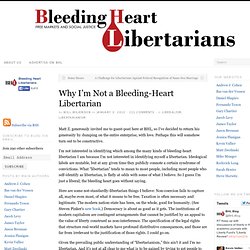
Perhaps this will somehow turn out to be constructive. Worker self-management in historical perspective, 1950-2006. A brief history of the movement for workers' self-management in the 20th and 21st centuries.
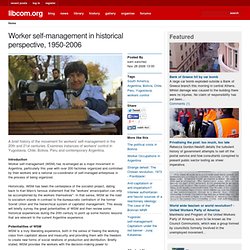
Examines instances of workers' control in Yugoslavia, Chile, Bolivia, Peru and contemporary Argentina. Introduction Worker self-management (WSM) has re-emerged as a major movement in Argentina, particularly this year with over 200 factories organized and controlled by their workers and a national co-coordinator of self-managed enterprises in the process of being organized. Historically, WSM has been the centerpiece of the socialist project, dating back to Karl Marx's famous statement that the "workers' emancipation can only be accomplished by the workers themselves".
In that sense, WSM as the road to socialism stands in contrast to the bureaucratic centralism of the former Soviet Union and the hierarchical system of capitalist management. Argentina’s Economic Model? Introduction Worker self-management (WSM) has re-emerged as a major movement in Argentina, particularly this year with over 200 factories organized and controlled by their workers and a national co-coordinator of self-managed enterprises in the process of being organized.

The Fourth World War Has Begun Subcomandante Marcos. Camila vallejo. VOTING. The Myth of the Rational Voter: Why Democracies Choose Bad Policies is a 2007 book written by Bryan Caplan challenging the notion that voters are reasonable people that society can trust to make laws.
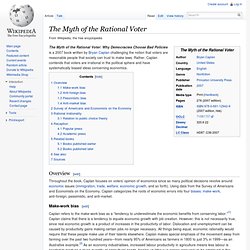
Rather, Caplan contends that voters are irrational in the political sphere and have systematically biased ideas concerning economics. Overview[edit] Throughout the book, Caplan focuses on voters’ opinion of economics since so many political decisions revolve around economic issues (immigration, trade, welfare, economic growth, and so forth). Using data from the Survey of Americans and Economists on the Economy, Caplan categorizes the roots of economic errors into four biases: make-work, anti-foreign, pessimistic, and anti-market.
Make-work bias[edit] Caplan refers to the make-work bias as a “tendency to underestimate the economic benefits from conserving labor.”[1] Caplan claims that there is a tendency to equate economic growth with job creation. Anti-foreign bias[edit] How Australian Pollsters lean. One of the questions that often gets asked is whether a given pollster generally delivers a higher vote estimate for a party than other pollsters – basically, whether a polling firm such as, say, Newspoll (to choose a random polling organisation), leans towards one party or the other.
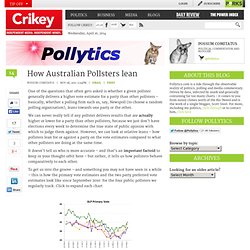
We can never really tell if any pollster delivers results that are actually higher or lower for a party than other pollsters, because we just don’t have elections every week to determine the true state of public opinion with which to judge them against. Top All-Time Donors, 1989-2010. This list includes the organizations that have historically qualified as "heavy hitters" — groups that lobby and spend big, with large sums sent to candidates, parties and leadership PACs.
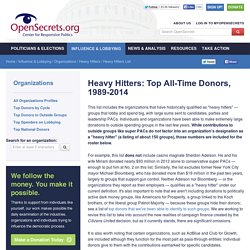
Individuals and organizations have been able to make extremely large donations to outside spending groups in the last few years. While contributions to outside groups like super PACs do not factor into an organization's designation as a "heavy hitter" (a listing of about 150 groups), those numbers are included for the roster below. For example, this list does not include casino magnate Sheldon Adelson. He and his wife Miriam donated nearly $93 million in 2012 alone to conservative super PACs — enough to put him at No. 2 on this list. Similarly, the list excludes former New York City mayor Michael Bloomberg, who has donated more than $19 million in the past two years, largely to groups that support gun control. Partisan tilt: Historical Profile.
Iraq & Afghanistan wars proved a windfall for a small circle of private contractors. Posted by editor on Wednesday, September 14, 2011 · 10 Comments The U.S.
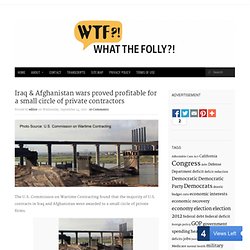
Commission on Wartime Contracting found that the majority of U.S. contracts in Iraq and Afghanistan were awarded to a small circle of private firms. Al Fatah Bridge & Oil Pipeline in Iraq. PHOTO SOURCE: U.S. Commission on Wartime Contracting “Contingency-contract spending in Iraq and Afghanistan is highly concentrated,” according to the commission’s final report, “Transforming Wartime Contracting: Controlling Costs, Reducing Risks.” The top 22 firms (listed below) took in $139.2 billion of the total $192.5 billion private contracts awarded between fiscal year 2002 and mid-fiscal year 2011, accounting for more than 52% of the total budget. Here is a list of firms that were awarded billion dollar contracts for military and civilian operations in Iraq and Afghanistan between 2002 and 2011: American Opinion - American Review - Global Perspectives on America. Think tanks and foreign services that shun social media are being left behind By Rory Medcalf The boundaries between journalism, intelligence, diplomacy and think tank analysis are dissolving at a rapid rate, thanks to the unstoppable advance of social media.